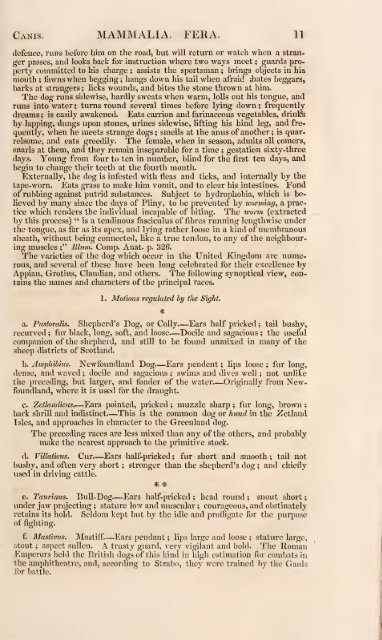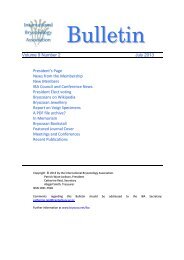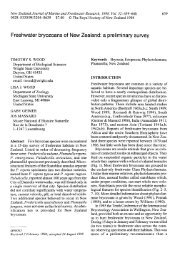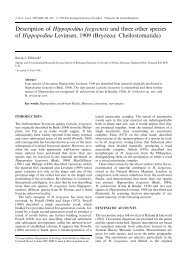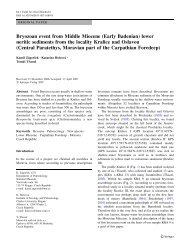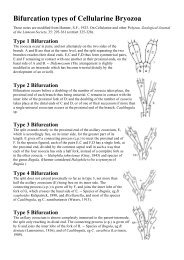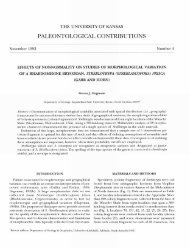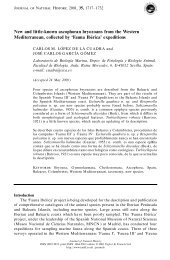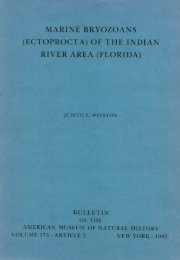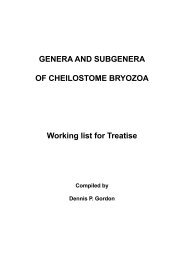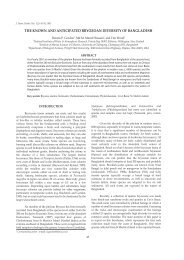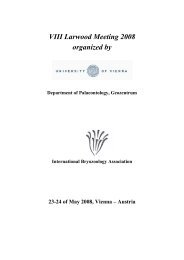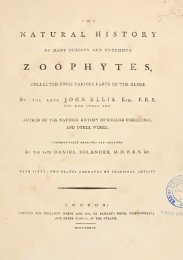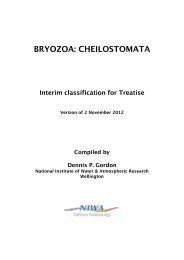- Page 1: IMS
- Page 8 and 9: P. Neii.t., Printer.
- Page 10 and 11: ViPREFACE.vailed in the science of
- Page 12 and 13: VlllPREFACE.treatise exceed a thous
- Page 14 and 15: XPREFACE.In the translation of Gmel
- Page 16 and 17: XllPREFACE.animals, and many valuab
- Page 18 and 19: .XIVPREFACE.selves to all the chang
- Page 21 and 22: PREFACE.XV11VI.Primitive Epoch. —
- Page 23 and 24: PREFACE.XIXfrequently, as probably
- Page 25 and 26: PREFACE.XXIand quoted onlythe works
- Page 27: (xxiii)CONTENTS,
- Page 30 and 31: 2 BRITISH ANIMALS,I.VERTEBRAL ANIMA
- Page 32 and 33: BRITISH ANIMALS-MAMMALIA.Order I. P
- Page 34 and 35: 6 MAMMALIA. CHEIROPTERA. ViisrERTiL
- Page 36 and 37: 8 MAMMALIA. FERA. Sorex.duced, and
- Page 40 and 41: 12 MAMMALIA. FERA. Canis.***g. Scot
- Page 42 and 43: 14 MAMMALIA. FERA. Martes.Mustek, M
- Page 44 and 45: 16 MAMMALIA. FERA. Lutra.in Ireland
- Page 46 and 47: 18 MAMMALIA. FERA. Trichechus.22. P
- Page 48 and 49: 20 MAMMALIA. FERA. Sciurus.The late
- Page 50 and 51: n MAMMALIA. FERA. Mvoxrs.common kin
- Page 52 and 53: 24 MAMMALIA. PECORA. Bos.cap. 3.),
- Page 54 and 55: 26 MAMMALIA. PECORA. Cervus.II. Hor
- Page 56 and 57: 28 MAMMALIA. BELLU/E. Sb'siThat thi
- Page 58 and 59: SO MAMMALIA. CETACEA. Bal.enopteiia
- Page 60 and 61: S3 MAMMALIA. CETACEA. Physalis.Burn
- Page 62 and 63: U MAMMALIA. CETACEA. Delfhinus,tab.
- Page 64 and 65: H MAMMALIA, CETACEA. Delphinapteba.
- Page 66 and 67: 38 MAMMALIA. CETACEA. Physeter.form
- Page 68 and 69: 40 MAMMALIA. CETACE. Physeter.kenzi
- Page 70 and 71: 42 BRITISH ANIMALS.Class II.BIRDS.f
- Page 72 and 73: 44 BIRDS. GALLINAD.E. Perdix.Tetrao
- Page 74: 46 BIRDS. GALLINAD.E. Gallus.3. Gal
- Page 77 and 78: Falco. BXHDS. ACCIPITRES. 4,9** Con
- Page 79 and 80: Gyrfalco. BIRDS. ACCIPITRES. 5114.
- Page 81 and 82: Circus. BIRDS. ACCIPITRES. o3tail i
- Page 83 and 84: Buteo. BIRDS. ACCIPITRES. 55De Acci
- Page 85 and 86: Aluco. BIRDS. ACCIPITRES. 51They ha
- Page 87 and 88: BIRDS. PASSERES. 591. Upper mandibl
- Page 89 and 90:
Hibundo. BIRDS. PASSERES. 6Jagainst
- Page 91 and 92:
Muscicapa. BIRDS. PASSERES. 63insec
- Page 93 and 94:
Tuedus. BIRDS. PASSERES. 65Length 9
- Page 95 and 96:
Saxicola. BIRDS. PASSERES. 6752. C.
- Page 97 and 98:
Cukkuca. BIRDS. PASSERES. 6058. C.
- Page 99 and 100:
Accentor. BIRDS. PASSERES. 71Latham
- Page 101 and 102:
Troglodytes. BIRDS. PASSERES. 73din
- Page 103 and 104:
Anthus. BIRDS. PASSERES. 75beneath,
- Page 105 and 106:
Emberiza. BIRDS. PASSERES. 77Length
- Page 107 and 108:
Alauda. BIRDS. PASSERES. 79Gen. XL.
- Page 109 and 110:
Sitta. BIRDS. PASSERES. 81Back oliv
- Page 111 and 112:
Pvrgita. BIRDS. PASSERES. 88ash-gre
- Page 113 and 114:
Fringilla. BIRDS. PASSERES. 85Linar
- Page 115 and 116:
Pica. BIRDS. PASSERES. 87111. P. ca
- Page 117 and 118:
Cekthia. BIRDS. PASSERES. 80Length
- Page 119 and 120:
Picus. BIRDS. SCAN SORES. 91to Barr
- Page 121 and 122:
BIRDS. GRALLiE. 93of England, but r
- Page 123 and 124:
Ardea. BIRDS. CULTRIROSTRES. 95CULT
- Page 125 and 126:
Ardea. BIRDS. CULTRIROSTRES. 97cove
- Page 127 and 128:
Gallinula. BIRDS. PRESSIROSTRES. 99
- Page 129 and 130:
Recurvirostra. BIRDS. PRESSIROSTRES
- Page 131 and 132:
Totanus. BIRDS. PRESSIROSTRES. 103Q
- Page 133 and 134:
Scolopax. BIRDS. PRESSIROSTRES. 105
- Page 135 and 136:
Limosa. BIRDS. PRESSIROSTRES. 107Ge
- Page 137 and 138:
Teinga. BIRDS. PRESSIROSTRES. 109Li
- Page 139 and 140:
Vanellus. BIRDS. PRESSIROSTRES. Ill
- Page 141 and 142:
Charadrius. BIRDS. PRESSIROSTRFS. U
- Page 143 and 144:
Hem ato pus. BIRDS. PRESSIROSTRES.
- Page 145 and 146:
Phalacrocorax. BIRDS. PALMIPIDES. 1
- Page 147 and 148:
Oidemia. BIRDS. PALMIP1DES. 119Leit
- Page 149 and 150:
Nyroca. BIRDS. PALMIPIDES. 1^1eyes,
- Page 151 and 152:
Spathulea. BIRDS. PALMiriDES. 123si
- Page 153 and 154:
Anas. BIRDS. PALMIPIDES. 125ruginou
- Page 155 and 156:
Ctgnus. BIRDS. PALMIPIDES. 127orang
- Page 157 and 158:
Alca. BIRDS. PALMIPIDES. 129part of
- Page 159 and 160:
Podiceps. BIRDS. PALMIPIDES. 131ora
- Page 161 and 162:
Colymbus. BIRDS. PALMIPIDES. 133rid
- Page 163 and 164:
Mergulus. BIRDS. PALMIPIDES. 135and
- Page 165 and 166:
Puffinus. BIRDS. FALMIPIDES. 137Gen
- Page 167 and 168:
Larus. BIRDS. PALMIPIDES. 189size.
- Page 169 and 170:
Larus. BIRDS. PALMIPIDES. 141Length
- Page 171 and 172:
Sterna. BIRDS. PALMIPIDES. 143Lengt
- Page 173 and 174:
InBIRDS. 145the preceding observati
- Page 175 and 176:
Class HI.REPTILES.x 8
- Page 177 and 178:
Chelona. REPTILES. CHELONIA. 149CHE
- Page 179 and 180:
Lacerta. REPTILES. SAURIA. 151Lengt
- Page 181 and 182:
Lacerta. REPTILES. SAURIA. 15(31. I
- Page 183 and 184:
Anguis. REPTILES. OPHIDIA. 155it po
- Page 185 and 186:
Tnilox. REPTILES. BATRACHIA. 157Ang
- Page 187:
Euro. REPTILES. BATRACHIA. 159ponds
- Page 190 and 191:
( 162)Class IV. FISHES.Order I. CAR
- Page 192 and 193:
164 FISHES. CHONDROPT. Ammoccetesnu
- Page 194 and 195:
166 FISHES. CHONDROPT. Mustelus.dif
- Page 196 and 197:
168 FISHES. CHONDROPT. Lamna.we cal
- Page 198 and 199:
170 FISHES. CHONDROPT. Raia.18. T.
- Page 200 and 201:
172 FISHES. CHONDROPT. Rata.dark br
- Page 202 and 203:
174 FISHES. CHONDROPT. Acipensek.an
- Page 204 and 205:
176 FISHES. OSSEOUS. Syngnathus.add
- Page 206 and 207:
178 MALACOPTERYGIOUS FISHES.eo. Bre
- Page 208 and 209:
180 FISHES. MALACOPTERYGIOUS. Salmo
- Page 210 and 211:
182 FISHES. MALACOPTERYGIOUS. Cltjp
- Page 212 and 213:
184 FISHES. MALACOPTERYGIOUS. Belon
- Page 214 and 215:
186 FISHES. MALACOPTERYGIOUS. Gobio
- Page 216 and 217:
188 FISHES. MALACOPTERYGIOUS. Gobit
- Page 218 and 219:
190 FISHES. MALACOPTERYGIOUS. Cyclo
- Page 220 and 221:
192 FISHES. MALACOPTERYGIOUS. Molva
- Page 222 and 223:
194 FISHES. MALACOPTERYGIOUS. Ranic
- Page 224 and 225:
196 FISHES. MALACOPTERYGIOUS. Pleur
- Page 226 and 227:
198 FISHES. MALACOPTERYGIOUS. Plate
- Page 228 and 229:
200 FISHES. MALACOPT. Leptocephalus
- Page 230 and 231:
(202 )ACANTHOPTERYGIOUS FISHES.Sect
- Page 232 and 233:
204 FISHES. ACANTHOPT. Cepola.Gen.
- Page 234 and 235:
206 FISHES. ACANTHOPT. Gobius.Gen.
- Page 236 and 237:
5208 FISHES. ACANTHOPT. Callionymus
- Page 238 and 239:
210 FISHES. ACANTHOPT. Julis.the ir
- Page 240 and 241:
212 FISHES. ACANTHOPT. Serranus.bel
- Page 242 and 243:
214 FISHES. ACANTHOPT. Lophius.Aran
- Page 244 and 245:
216 FISHES. ACANTHOPT. Cottus.Lengt
- Page 246 and 247:
218 FISHES. ACANTHOPT. Trachurus.D.
- Page 248 and 249:
220 FISHES. ACANTHOPT. Xiphias.Leng
- Page 250 and 251:
222 FISHES.But there are other move
- Page 252 and 253:
(224)INVERTEBRAL ANIMALS.[. GANGLIA
- Page 254 and 255:
NAUTIL1DJE.I. Partitions of the cha
- Page 256 and 257:
228 MOLLUSCA. CEPHALOPODA. Nautilus
- Page 258 and 259:
230 MOLLUSCA. CEPHALOPODA. Nautilus
- Page 260 and 261:
232 MOLLUSCA. CEPHALOPODA. Rotalia.
- Page 262 and 263:
234 MOLLUSCA. CErHALOPODA. Arethusa
- Page 264 and 265:
236 MOLLUSCA. CEPHALOPODA. Oethocei
- Page 266 and 267:
238 MOLLUSCA. CEPHALOPODA. Okthocer
- Page 268 and 269:
240 MOLLUSCA. CEPHALOPODA. Conulari
- Page 270 and 271:
242 MOLLUSCA. CEPHALOPODA. Ammonita
- Page 272 and 273:
C2U MOLLUSCA. CEPHALOPODA. Ammonita
- Page 274 and 275:
246 MOLLUSCA. CEPHALOPODA. Ammonita
- Page 276 and 277:
248 MOLLUSCA. CEPHALOPODA. Orbulita
- Page 278 and 279:
2, 3— Chalk Marl. ** Spires dextr
- Page 280 and 281:
252 MOLLUSCA. CEPHALOPODA. Sepia.6.
- Page 282 and 283:
254 MOLLUSCA. CEPHALOFODA. Octopus.
- Page 284 and 285:
256 MOLLUSCA. PULMONIFERA. Amon.LIM
- Page 286 and 287:
258 MOLLUSCA. PULMONIFERA. Cyclosto
- Page 288 and 289:
.Buccinum260 MOLLUSCA. PULMONIFERA.
- Page 290 and 291:
262 MOLLUSCA. PULMONIFERA. Helix.67
- Page 292 and 293:
264 MOLLUSCA. PULMONIFERA. Helix.76
- Page 294 and 295:
266 MOLLUSCA. PULMONIFERA. Bulimus.
- Page 296 and 297:
268 MOLLUSC A. PULMONIFERA. Pupa,Ge
- Page 298 and 299:
no MOLLUSCA. PULMONIFERA. Carychium
- Page 300 and 301:
%T2 MOLLUSC A. PULMONIFERA. Vertigo
- Page 302 and 303:
274 MOLLUSCA. PULMONIFERA. Limnea,H
- Page 304 and 305:
.cloak276' MOLLUSCA. PULMONIFERA. P
- Page 306 and 307:
27S MOLLUSCA. PULMONIFERA. Planorbi
- Page 308 and 309:
280 MOLLUSCA. PULMONIFERA. Segmenti
- Page 310 and 311:
282 MOLLUSCA. BRANCHIFERA. Doris.Ge
- Page 312 and 313:
284 MOLLUSCA. BRANCHIFERA. Tritonia
- Page 314 and 315:
286 MOLLUSCA. BRANCHIFERA. Valvata.
- Page 316 and 317:
288 MOLLUSCA. BRANCHIFERA. Chiton.I
- Page 318 and 319:
290 MOLLUSCA. BRANCHIFERA. Aplysia.
- Page 320 and 321:
292 MOLLUSCA. BRANCHIFERA. Bulla.La
- Page 322 and 323:
~ 180. B. aperta.— Shell smooth,
- Page 324 and 325:
296 MOLLUSCA. PECTINIBRANCHIA,PECTI
- Page 326 and 327:
298 MOLLUSCA. PECTINIBRANCHIA. Turb
- Page 328 and 329:
300 MOLLUSCA. PECTINIBRANCHIA. Turb
- Page 330 and 331:
302 MOLLUSCA. PECTINIBRANCHIA. Tuee
- Page 332 and 333:
304 MOLLUSCA. PECTINIBRANCHIA. Turr
- Page 334 and 335:
306 MOLLUSCA. PECTINIBRANCHIA. Cing
- Page 336 and 337:
308 MOLLUSCA. PECTINIBRANCHIA. Cing
- Page 338 and 339:
310 MOLLUSC A. PECTIN IBRANCHIA. Od
- Page 340 and 341:
312 MOLLUSC A. PECTIN IBRANCHI A. S
- Page 342 and 343:
:314 MOLLUSCA. PECTINIBRANCHIA. Ske
- Page 344 and 345:
316 MOLLUSCA. PECTINIBRANCHIA. Palu
- Page 346 and 347:
318 MOLLUSCA. PECTINIBRANCHIA. Neri
- Page 348 and 349:
320 MOLLUSCA. PECTINIBRANCHIA. Nati
- Page 350 and 351:
39£ MOLLUSCA. TROCHUSID.E. Tkochus
- Page 352 and 353:
324 MOLLUSCA. TllOCHUSID.E. Tkochus
- Page 354 and 355:
3£4 MOLLUSCA. TROCHUSID.E. Trochu-
- Page 356 and 357:
S26 MOLLUSCA. TROCHUSID.E. Ianthina
- Page 358 and 359:
328 MOLLUSCA. SOLENOSTOMATA.SOLENOS
- Page 360 and 361:
330 MOLLUSCA. SOLENOSTOMATA. Conus.
- Page 362 and 363:
332 MOLLUSCA. SOLENOSTOMATA. Voluta
- Page 364 and 365:
334 MOLLUSCA. SOLENOSTOMATA. Cancil
- Page 366 and 367:
336 MOLLUSCA. SOLENOSTOMATA. Tornat
- Page 368 and 369:
338 MOLLUSCA. TORNATELLADiE. Belleb
- Page 370 and 371:
Mi) MOLLUSC A. BUCCINID.E. MomcnGen
- Page 372 and 373:
342 MOLLUSCA. BUCCINID^E. Harfa.4.
- Page 374 and 375:
344 MOLLUSCA. BUCCINLDiE. Buccindm.
- Page 376 and 377:
346 MOLLUSCA. MURICID/E. Tkrebra.MU
- Page 378 and 379:
348 MOLLUSCA. MURICIDjE. Fusus.cent
- Page 380 and 381:
350 MOLLUSCA. MURIClELE. Fusus.336.
- Page 382 and 383:
352 MOLLUSCA. MURICIDiE. Fusus.Mure
- Page 384 and 385:
354 MOLLUSCA. MURICIDiE. Pleurotoma
- Page 386 and 387:
356 MOLLUSCA. MURICIDiE. Typhis.Gen
- Page 388 and 389:
358 MOLLUSCA. CERITHIAD.E. Potamidu
- Page 390 and 391:
360 MOLLUSCA. CERITHIAD^. Sigaretus
- Page 392 and 393:
362 MOLLUSC. PECTINIBRANCHIA. Halio
- Page 394 and 395:
364 MOLLUSCA. FISSURELLAD^. Fissure
- Page 396 and 397:
366 MOLLUSCA. FISSURELLADiE. Scissu
- Page 398 and 399:
36S MOLLUSCA. ACEPHALA. Lingula.PED
- Page 400 and 401:
370 MOLLUSCA. ACEPHALA. Terebratula
- Page 402 and 403:
372 MOLLUSCA. ACEPHALA. Terebratula
- Page 404 and 405:
374 MOLLUSCA. ACEPHALA. Spirifer.71
- Page 406 and 407:
376 MOLLUSCA. SESSILIA. Discinagin
- Page 408 and 409:
378 MOLLUSCA. SESSILIA. Pentamerus.
- Page 410 and 411:
380 MOLLUSCA, SESSILIA. Productus.2
- Page 412 and 413:
382 MOLLUSCA BIVALVIA.TI.Valves clo
- Page 414 and 415:
384 MOLLUSCA. BIVALVIA. Pecten.375.
- Page 416 and 417:
386 MOLLUSCA. BIVALVIA. Pecten.toot
- Page 418 and 419:
388 MOLLUSCA. BIVALVIA. Lima.Gen. X
- Page 420 and 421:
390 MOLLUSCA. PERNAD^. Gryph^a.3. G
- Page 422 and 423:
.388.1392 MOLLUSCA. OSTREAD.E. Ostr
- Page 424 and 425:
^94 MOLLUSCA. OSTREAD^. Anomia.** V
- Page 426 and 427:
396 MOLLUSCA. OSTREADiE. Anomia.Tar
- Page 428 and 429:
398 MOLLUSCA. ARCADE. Arc arior sid
- Page 430 and 431:
400 MOLLUSCA. ARCADE. Pectunculus,u
- Page 432 and 433:
402 MOLLUSCA. ARCADE. Nucula.Length
- Page 434 and 435:
404 MOLLUSCA. TRIGONIADtE. Tuigonia
- Page 436 and 437:
40G MOLLUSCA. TRIGONIAD^E. Pinna2.
- Page 438 and 439:
408 MOLLUSCA. SIPHONIDA.SIPHONIDA.I
- Page 440 and 441:
410 MOLLUSCA. SIPHONIDA.A A. Destit
- Page 442 and 443:
412 MOLLUSCA. MYTILID^. Modiola.EXT
- Page 444 and 445:
414 MOLLUSCA. MYTILIMJ. Lithodomus.
- Page 446 and 447:
416 MOLLUSCA. UNIONIDiE. Unio.Gen.
- Page 448 and 449:
418 MOLLUSCA. CARDITADiE. Carhtta.5
- Page 450 and 451:
420 MOLLUSCA. CARDIADjE. Isoqardia.
- Page 452 and 453:
422 MOLLUSCA. CARDIAD^. Cabdium.435
- Page 454 and 455:
424 MOLLUSCA. CARDIADjE. Pholadomy^
- Page 456 and 457:
C.426 MOLLUSCA. CORBULADiE. Mactua.
- Page 458 and 459:
428 MOLLUSCA. MACTRADtE. Mactra.449
- Page 460 and 461:
430 MOLLUSCA. MACTRAD^E. Kellia.Gen
- Page 462 and 463:
432 MOLLUSCA. MACTRAD^. Amphidksma.
- Page 464 and 465:
434 MOLLUSCA. DONACIDiE. Capsa.Tell
- Page 466 and 467:
436 MOLLUSCA. DONACID^. Tellina.Len
- Page 468 and 469:
438 MOLLUSCA. PSAMMOBIAM]. Psammobi
- Page 470 and 471:
MO MOLLUSCA. PSAMMOBIADJ5. Astaetjs
- Page 472 and 473:
442 MOLLUSCA. LUCINADiE. LucinaPect
- Page 474 and 475:
444 MOLLUSCA. VENERID^. Cyprina.Bri
- Page 476 and 477:
446 MOLLUSCA. VENERIDiE. Cvtherea.5
- Page 478 and 479:
448 MOLLUSCA. VENERID^. Venus528. V
- Page 480 and 481:
450 MOLLUSCA. VENERIDyE. Venus.2. V
- Page 482 and 483:
452 MOLLUSCA. CYCLAD.E. Cyclas.542.
- Page 484 and 485:
454 MOLLUSCA. TEREDINADiE. TeredoGe
- Page 486 and 487:
456 MOLLUSCA. PHOLAD^. PholasPHOLAD
- Page 488 and 489:
458 MOLLUSCA. PHOLADiE. Gastrocilen
- Page 490 and 491:
460 MOLLUSCA. SOLENIDiE. Sanguinola
- Page 492 and 493:
im MOLLUSCA. SOLENID^E. Panop.ea-11
- Page 494 and 495:
404 MOLLUSCA. MYAD.E. Lutraria.4. M
- Page 496 and 497:
4*66 MOLLUSCA. MYAD.E. Pandora.Leng
- Page 498 and 499:
468 MOLLUSCA. TUNICATA. Pandocia.Ge
- Page 500 and 501:
470 MOLLUSCA. TUNICATA. Alpimum.int
- Page 502 and 503:
472 RADIATA.RADIATA.Class I.ECHINOD
- Page 504 and 505:
474 RADIATA; ECHINODERMATA,ECHINIDJ
- Page 506 and 507:
476 RADIATA. ANOCYSTI.tallizes as r
- Page 508 and 509:
4*78 RADIATA. ANOCYSTI. Echinus.twe
- Page 510 and 511:
480 RADIATA. PLEUROCYSTI. Spatangus
- Page 512 and 513:
482 RADIATA. FISTULID^. Holothukia-
- Page 514 and 515:
484 RADIATA. FISTULIDvE. Mdlleeia.G
- Page 516 and 517:
486 RADIATA. ASTERIAO.E. Asterias,D
- Page 518 and 519:
4S8 RADIATA. ASTERIAD.E. OphiuraGen
- Page 520 and 521:
490 RADIATA. ASTERIADtE. Comatula.c
- Page 522 and 523:
492 RADIATA. ASTERIADtE. Priapulus,
- Page 524 and 525:
494 RADIATA. CRINOIDiE. Pentacrinus
- Page 526 and 527:
496 RADIATA. BLASTOIDJE. Platyciuni
- Page 528 and 529:
498 RADIATA. ACALEPHA. Actinea.42.
- Page 530 and 531:
500 RADIATA. ACALEPHA. Velella.Gen.
- Page 532 and 533:
502 RADIATA. ACALEPHA. Rhizostoma.M
- Page 534 and 535:
504 RADIATA. ACALEPHA. Pleurobrachi
- Page 536 and 537:
(506)CARNOSA.I. Free; marine; movin
- Page 538 and 539:
506 ZOOPHYTA. CARNOSA. Saecinula.ti
- Page 540 and 541:
510 ZOOPHYTA. LAMELLIFER^E. Cycloli
- Page 542 and 543:
512 ZOOPHYTA. GORGONIADiE. Gorgonja
- Page 544 and 545:
514 ZOOPHYTA. CORALLINAD^. Jania.Ge
- Page 546 and 547:
516 ZOOPHYTA. CORALLINAD.E. Lobular
- Page 548 and 549:
518 ZOOPHYTA. CORALLINADjE. Alcyoni
- Page 550 and 551:
520 ZOOPHYTA. SPONGIAMI. Halichondr
- Page 552 and 553:
524 ZOOPHYTA. SPONGIADiE. Halichond
- Page 554 and 555:
526 ZOOPHYTA. SPONGIAD^. Spongia.th
- Page 556 and 557:
528 ZOOPHYTA. CELLULTFERA. Millepor
- Page 558 and 559:
530 ZOOPHYTA. TUBIPORAMJ. Discopora
- Page 560 and 561:
532 ZOOPHYTA. ESCHARADtE. Cellepor,
- Page 562 and 563:
534 ZOOPHYTA. ESCHARADjE Hupothoa.G
- Page 564 and 565:
536 ZOOPHYTA. FLUSTRAD^. Flustra.ab
- Page 566 and 567:
( 538)THECATA.I. Sheath slight/// c
- Page 568 and 569:
540 ZOOPHYTA. CELLARIAD^. Tuicellar
- Page 570 and 571:
542 ZOOPHYTA. SERTULARIAM1. Sertula
- Page 572 and 573:
544 ZOOPHYTA. SERTULAMADjE. Dynamen
- Page 574 and 575:
j46 ZOOPHYTA. SERTULARIAD^. Plumula
- Page 576 and 577:
548 ZOOPHYTA. SERTULARIAD^. Campanu
- Page 578 and 579:
550 ZOOPHYTA. SERTULARIADvE. Valker
- Page 580 and 581:
52 ZOOPHYTA. TUBULARIADtE. Tubulari
- Page 582 and 583:
554 ZOOPHYTA. NUDA. Hydra.Height ab
- Page 585 and 586:
( 557 )INDEX.The Vernacular Names a
- Page 587 and 588:
Conularia,INDEX. 559
- Page 590 and 591:
562 INDEX.Myrtea,
- Page 592:
564Sigaretus,Silurus,Sipunculus,Sis
- Page 602:
IeaaMHJS


